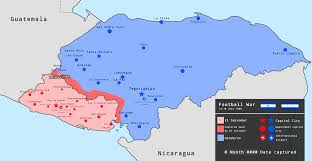
Introduction
The rivalry between El Salvador and Honduras is not only steeped in rich history and culture but has also been marked by significant political and social implications. This regional feud, particularly visible in sports, stirs passion in both nations, drawing numerous fans and media attention. Understanding this rivalry is crucial for grasping the geopolitical landscape of Central America, marked by both cooperation and conflict.
Historical Context
The roots of the El Salvador-Honduras rivalry can be traced back to the mid-20th century, developing amid conditions of economic disparity and demographic challenges. Tensions escalated notably during the infamous “Football War” in 1969, which was sparked by conflicts surrounding soccer matches and was exacerbated by long-standing immigration disputes and land reform issues. This war resulted in thousands of casualties and set a precedent for how sports could impact national sentiments.
Sports Rivalry
Today, the most visible manifestation of the El Salvador vs Honduras rivalry can be observed in soccer, a sport that engages millions of fans. The fixtures between the national teams are highly anticipated events, often filled with intense emotions and fervent supporters. Matches in World Cup qualifiers or regional competitions, such as the CONCACAF Gold Cup, have often seen clashes that reflect deeper socio-political sentiments.
Recent matches have continued this trend, with both teams exhibiting competitive spirit on the field. The last significant encounter occurred in 2021, during World Cup qualifying rounds, where Honduras triumphed over El Salvador, a result that amplified national pride and animosity.
Conclusion
The El Salvador vs Honduras rivalry extends beyond sporting events; it serves as a lens through which we can examine broader regional relations, identity, and culture. While both countries have made strides towards economic development and regional cooperation, the echoes of historic grievances remain. As they continue to face shared challenges like migration, economic instability, and climate change, the hope is that sports can transform rivalry into bridges of understanding rather than barriers. As fans gear up for future matches, the stakes remain high, not just for pride on the field, but for the broader narrative of unity and respect between two nations.



